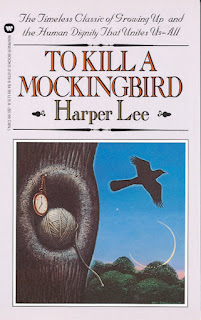"Atticus, he was real nice ..."
His hands were under my chin, pulling up the cover, tucking it around me. "Most people are, Scout, when you finally see them."
There are a few texts whose ideas and characters have had a profound effect on me. Like parables told in a religious text or delivered in a sermon, these stories have shaped my values and ethics, and are of great significance to me. None moreso than Harper Lee’s To Kill a Mockingbird, a novel I come back to each year and from which I have learned some really great ideas.
Yes, this choice may be a stereotype, particularly for an impressionable, young, left-wing lawyer like me. But my experience is that stereotypes are often founded on some truth. Uniqueness is a luxury of the rare. In this world of billions of people, I fit so many other stereotypes - gay, male, introvert, Vietnamese, Pisces, lawyer, Canberran. What I’ve learned from this novel is that while stereotypes may have some basis in reality, it does not reflect the whole truth. Stereotypes are not the lens through which we should completely and finally view a person or their actions. Rather, they are a gateway based on social understandings and contexts, always to be scrutinised and understood against a persons’s individual experience and motivations.
For me, this novel is so rich because I continuously find parallels between it and my real life, both in general like above, or through more specific scenes. For example, I recently played Articulate, a board game with my lawyer colleagues in which we had to articulate a word without saying that word, or what it sounded or rhymed like. When I got the word ‘dill’, I first described the green herb, before going straight to ‘a character in To Kill a Mockingbird’. Needless to say, this was not that helpful and my turn passed. (You learn so much about yourself and your colleagues with this game. For my team, 'novel by Jeffrey Eugenides' was a better hint than 'county in England').
A more significant and emotional reference was also made recently, when I read about the scenes in Parliament during the recent passage of the marriage equality laws. The Sydney Morning Herald began their analysis by setting the following scene:
Never had a larger, more expectant crowd sat so intently and for so long in the public galleries of the House of Representatives. Barely a seat lay empty all the long day, the morning creeping into the afternoon, the afternoon edging towards evening, anticipation intensifying. Not an occupant of a pew was willing to drift away until all the words, thousands and thousands of them, had been uttered on the floor below. They knew what it was to wait, all these visitors to the Parliament, more than 600 of them.
They had waited so long - lifetimes, a lot of them. And so, up there in the green bleachers and even higher, crammed into the glassed-off enclosures usually set aside for schoolchildren, patience was observed, the sun outside moving across a big Canberra sky.
Expectation and hope, however, cannot be contained forever.
At precisely 5:58pm, the whole place felt and sounded as if it had exploded.
Mixed with the relief and jubilation of the moment, I had a semi-out of body experience where my mind immediately turned to the court scenes in To Kill a Mockingbird. Lee sets the scene in the court house with the whole town of Maycomb stayed in their seats for the entire trial, with the ‘colored folks’ sitting up top, and the whites, lawyers, and judge were sitting below where the real action was.
I had never seen a packed courtroom so still. Sometimes a baby would cry out fretfully, and a child would scurry out, but the grown people sat as if they were in church. In the balcony, the Negroes sat and stood around us with biblical patience.
What touched me was that both scenes reflected how important both events were, with nary a person moving the whole day. More critically, a friend correctly pointed out that in both scenes, it was the majority on the floor of parliament and court room that were deciding the fates of the minority sitting on top. While there were equality champions on the floor, it should not have even come to this.
These are but two examples of how my mind jumps to scenes from this novel as a point of reference for both everyday activities, and opportunities to reflect on the world and my life. In relation to the latter, I really love the novel because it has helped shape my understanding of the law and how legal concepts may work in practice. One of my favourite scenes occurs after Uncle Jack punishes Scout for swearing and fighting with her cousin, Scout explains to him that she only did it because her cousin was disrespecting Atticus by calling him a ‘n*gger lover’. Scout explained to Uncle Jack that usually, if she and Jem fought, Atticus would hear both her and Jem’s sides of the story before deciding punishment.
To me, this is a perfect illustration of the concept of procedural fairness (also known as natural justice or due process) and why it is important. Here, Uncle Jack failed to give Scout an opportunity to defend herself, and in the process, failed to understand the context and Scout’s true motivations. He had pre-judged her based on her previous behaviour and his previous warnings and interactions with her. In doing so, he also failed to understand the entire circumstances and context of her behaviour, which was relevant in showing that there was extreme provocation, one of the available defences of the rule that Uncle Jack had previously made. Little did I know that when I read this passage in Year 9 that it would help my understanding of the law for many years later.
Like all the best stories, the novel strikes a good balance between being dramatic and didactic. The episodic structure of the novel may create some artificial ‘fables’ in Scouts life but it is written in winning style, full of humour and pinpoint observations. However, the throughline for all these fables is that where there is difference and suffering, people and their actions are viewed through the lens of curiosity, understanding, empathy and ultimately, compassion. In the end, most people are really nice when you get to know them, and in this way we are all the 'one folk'. It is not hard to see why the fables of Scout’s experience have been a favourite foundation for countless readers, including me.
But it is difficult for me to write about all the ways in which this novel has affected my life. It’s a text I turn to again and again, drawing on in my relations with the law, with family, and with children. No doubt, there will be more posts about this great novel in the future.



Comments
Post a Comment